World leaders trade jabs over Syria at the United Nations
The 70th United Nations General Assembly gathering in New York featured a high-stakes squabble over the Syrian civil war and a refugee crisis that may illustrate the limits of world institutions and diplomacy.
President Obama and Russian President Vladimir Putin traded bitter accusations on the world’s highest diplomatic stage Monday, as they sought international support for their competing approaches to battling Islamic State and ending the conflict in Syria.
More than 140 heads of state and government weighed in during a weeklong debate.
Here's a look at how the meeting unfolded:
Leaders pledge 40,000 new forces for peacekeeping operations
Representatives of more than 50 countries took part in a high-level meeting Monday to bolster United Nations peacekeeping missions around the world, pledging to provide about 40,000 new soldiers and police for the effort, according to U.S. officials.
President Obama convened the meeting at a time when the U.N. is conducting 16 peacekeeping operations across four continents, including in some of the world's most volatile regions.
"Put simply, U.N. peacekeeping cannot keep up with growing demands," Obama told reporters. "This is not something we do for others; this is something we do collectively because our collective security depends on it."
The Obama administration, which provides more than a quarter of the $8.2-billion budget for such operations, has been pressing other countries to contribute more troops and equipment.
Most of the U.N.'s 125,000 peacekeeping personnel are provided by developing countries, with India and Pakistan among the largest contributors.
Obama promised Monday to double the number of U.S. military and police officers serving in peacekeeping missions, currently fewer than 100, and to expand the logistics and air support the country provides to the U.N.
Chinese President Xi Jinping made some of the largest commitments, announcing that China would take the lead in setting up an 8,000-strong military standby force and a police squad to respond to crisis around the world. Xi also pledged to provide about $100 million in military aid for a similar African Union force.
U.N. Secretary-General Ban Ki-moon reminded the participants of the need to take swift action when their troops are accused of abuses and to hold perpetrators to account. Peacekeepers in the Central African Republic have faced a series of accusations of sexual abuse and exploitation.
"Those who serve in peace operations must never prey on the people they are meant to protect," Ban said.
Obama and Putin reach no agreements on Syria and Ukraine
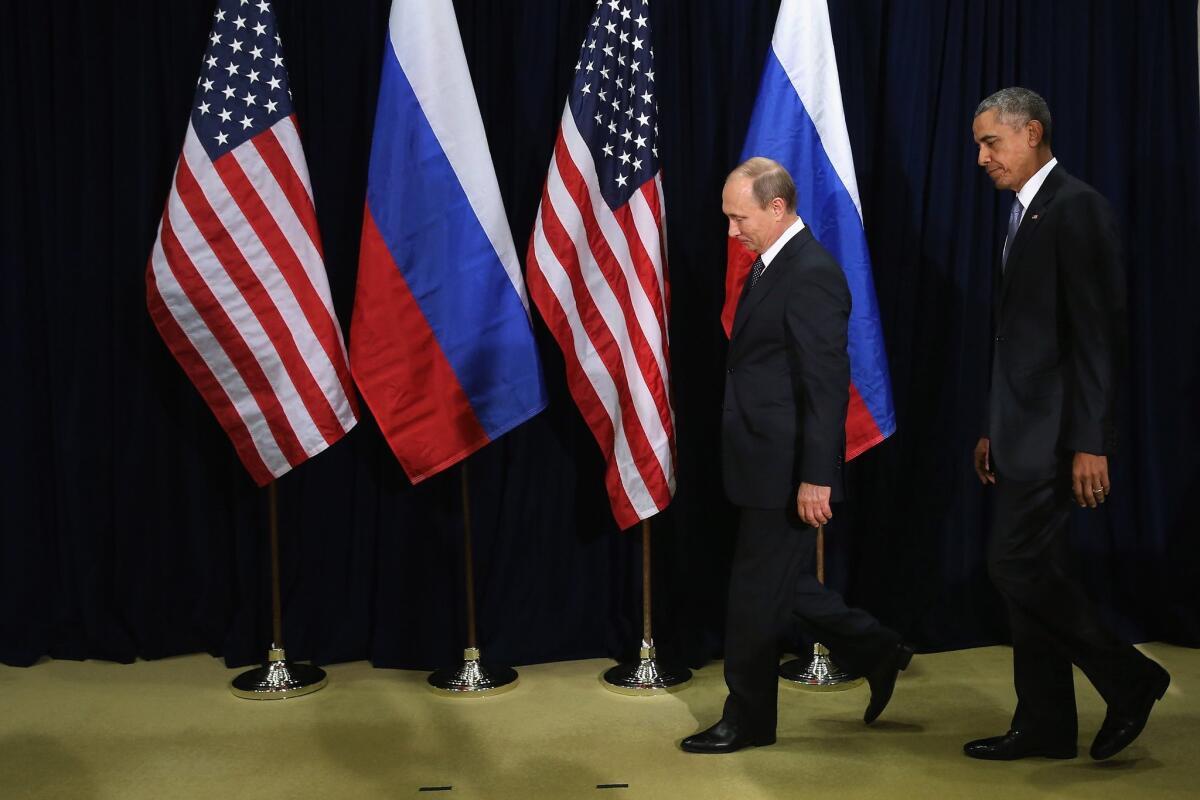
President Obama and Russian President Vladimir Putin at the United Nations on Sept. 28, 2015.
President Obama and Russian President Vladimir Putin had a "business-like back and forth" on Syria and Ukraine but reached no agreements, according to a senior Obama administration official.
The Russians see Syrian President Bashar Assad as a bulwark against extremists, the official said, while the Americans believe he exacerbates sectarian conflict there.
"I think the Russians certainly understood the importance of there being a political resolution in Syria and there being a process that pursues a political resolution," said the official, who requested anonymity to discuss the private meeting.
"We have a difference about what the outcome of that process would be," particularly as it relates to Assad, the official said.
The White House does not view Russia's military build-up in Syria as necessarily destructive to a positive outcome in Syria. If the forces are used to fight Islamic State, rather than bolster Assad, that might be acceptable, the official suggested.
Although the two leaders remain at odds, the White House described the meeting as productive.
"This was not a situation where either one of them was seeking to score points in a meeting," the official said. "I think there was a shared desire to figure out a way in which we can address the situation in Syria."
Putin does not rule out joining airstrikes against Islamic State
President Vladimir Putin says Russia has not ruled out joining airstrikes against the Islamic State in Syria but would not send ground troops into combat.
After his first meeting with President Obama in two years, the Kremlin chief said any Russian action would be in accordance with international law.
Putin said he and Obama discussed the U.S.-led coalition's action against the militants.
Asked if Russian aircraft could join the strikes against Islamic State, he said, "We are thinking about it, and we don't exclude anything."
He said the United States was taking part in efforts to settle the Ukrainian crisis, and that Washington was working with the Ukrainians and the Europeans to maintain diplomatic contacts with Russia to help reach a settlement.
The Russian leader said the talks were "very constructive, business-like and frank."
Obama and Putin in their own words
On the war in Syria:
On Russia's annexation of Ukraine's Crimea region:
The view from Moscow
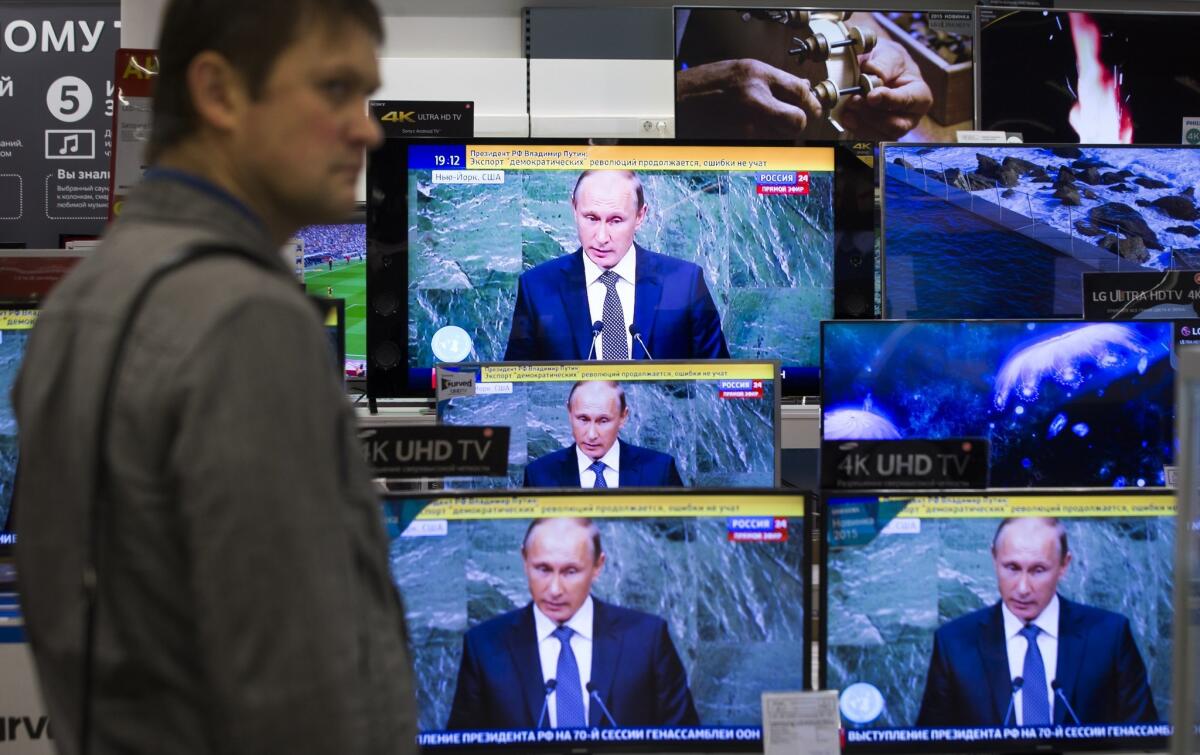
A man looks at television screens in a Moscow shop as Russian President Vladimir Putin addresses the United Nations on Sept. 28, 2015.
Fox News and CNN have nothing on Russian state television when it comes to rowdy political commentary.
Before and after the speeches by President Obama and Russian President Vladimir Putin at the United Nations General Assembly on Monday, scores of Russian politicians, analysts, advisors and journalists gathered in a studio of Russia's Channel One to shout over one another in a raucous scramble to air their views.
Half a dozen young women with portable microphones scurried among the mostly like-minded pundits seated in a rotunda to give the floor to the loudest.
¿What is most important is that the United States has recognized its mistakes and stopped trying to isolate us. They have returned to diplomacy and discussions, as we have urged,¿ Communist Party leader Gennady Zyuganov said to hearty applause.
The few oppositional voices in the televised debate added volume, especially independent political commentator Andrei Okara, who expressed hope that Obama and Putin would discuss the ¿principles¿ at stake in their strained relationship. He has deviated from the state-run media's mantra that Russia's annexation of Crimea last year was correction of a historic wrong and blames it for setting East and West on a contentious path likened to the Cold War.
The tower of babble subsided momentarily when Obama began his address but resumed within minutes, long before the U.S. leader had finished. In contrast, the debate adjourned when Putin addressed the world body with his plan for a broad coalition of forces to contain Islamic State and other militant forces.
After Putin's speech, the analysts resumed pushing a theme touted before the Kremlin leader's U.N. appearance, comparing the need to unite against Islamist extremists to the World War II alliance forged to defeat Nazi Germany.
Putin's address was ¿a strong, clear and compact analysis¿ of the common threat facing the world, said Andrei Kokoshin, dean of international affairs at Moscow State University, adding that it ¿recalls the spirit of the anti-Hitler coalition¿ that eradicated another evil 70 years ago.
A new Cold War between Russia and the U.S.?
There were times when the bitter taunts in the ornate diplomatic setting of the U.N. General Assembly recalled U.S. and Soviet diatribes during the Cold War.
Even as they declared a willingness to cooperate, President Obama and Russian President Vladimir Putin belittled the other's approach to the Middle East, blamed one another for the mounting bloodshed in Syria and accused the other of flouting international law.
In their speeches, they also jousted over the conflict in eastern Ukraine, the expansion of the NATO alliance, and the 2011 civil war in Libya.
Each president is trying to lead a coalition against Islamic State fighters who control large parts of Syria and Iraq. The U.S.-led group, which includes about 60 countries, has launched thousands of air strikes since August 2014, but the militants remain entrenched in several major urban strongholds.
Russia sent fighter jets, attack helicopters, tanks and other equipment to an air base in Syria this month to help prop up President Bashar Assad's government, which the U.S. opposes. Putin is trying to recruit other countries to join its unilateral effort, which is separate from the U.S.-led coalition.
The annual U.N. summit became the battleground Monday as the two leaders sought to win support for their different strategies.
Castro demands lifting of U.S. trade embargo
In his first address to the U.N. General Assembly, Cuban President Raul Castro hailed the restoration of diplomatic relations with the United States this year. But he said a "long and complicated process" remains before full normalization is achieved.
Castro, who was greeted with several rounds of sustained applause, reiterated his demand that the U.S. end its trade embargo against the island. He also called for a full return to Cuban control of the U.S. military prison at Guantanamo Bay.
Castro will have an opportunity to make his case directly to President Obama on Tuesday, when the two leaders hold a bilateral meeting on the sidelines of the U.N. gathering.
Mexico's president urges 'more humane response' to illegal drugs
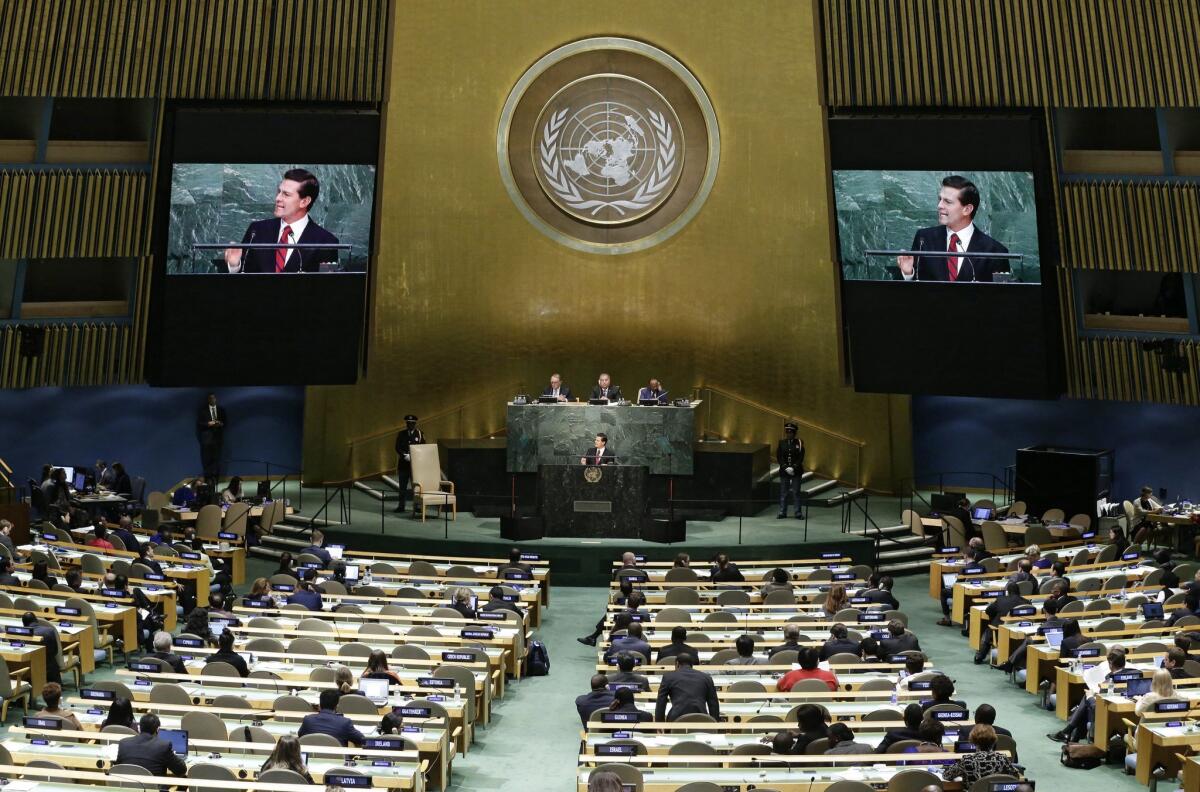
Mexican President Enrique Peña Nieto at the United Nations General Assembly on Sept. 28, 2015.
Mexican President Enrique Peña Nieto called on the world community to overcome its inertia and take a different approach to dealing with illegal drugs.
¿In Mexico, we believe in a more effective, more just and more humane response,¿ he said at the United Nations General Assembly. ¿The center of attention should be on the well-being and the dignity of the people.¿
Like other leaders who took to the podium Monday, Peña Nieto praised the United Nations for helping to promote peace in the decades since it was formed after World War II.
¿The world would not be the same without the United Nations organization,¿ he said.
Peña Nieto urged world leaders to treat migrants with respect and repeated his country's call to the United States to end the trade embargo against Cuba.
A United Nations first
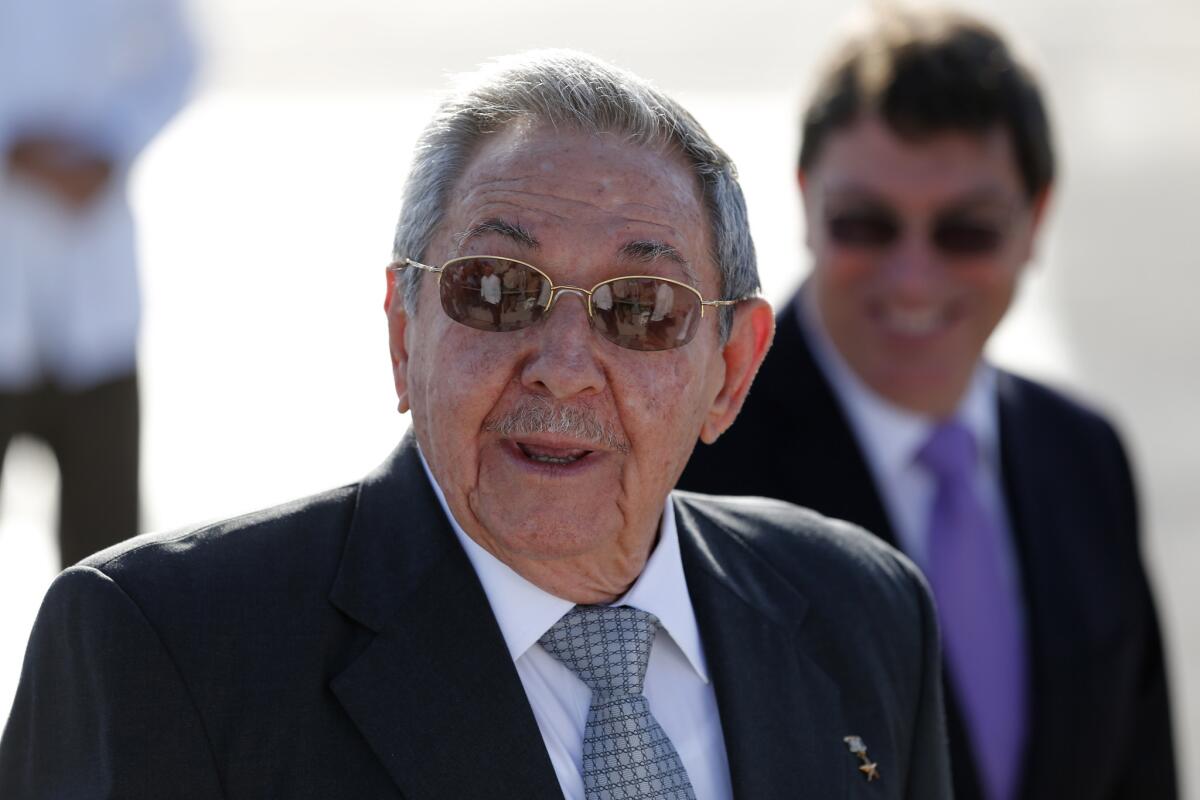
Cuban President Raul Castro in Havana on May 12, 2015.
This will be the first time that Cuban President Raul Castro speaks at a United Nations General Assembly session.
In his remarks Monday, Castro is expected to demand that the United States drop its decades-old trade embargo on Cuba, which has cost the country $121 billion, according to Cuban Foreign Minister Bruno Rodriguez.
President Obama has urged Congress to do so. But many key lawmakers are opposed, and any easing of the embargo is likely to be gradual.
U.S. critics, including conservative Republicans from Florida, contend that the Obama administration has made concessions on trade, travel and diplomatic relations between the countries without getting Havana to commit to significant democratic or human rights reforms.
Obama argues that normalizing relations offers the best prospect of bringing about changes for the Cuban people.
Ben Rhodes, a key Obama advisor, has said that the president ¿will have some opportunity¿ to meet with Castro during the U.N. session.
The two leaders spoke by phone last month but have not met since Washington and Havana restored diplomatic relations this summer after more than half a century.
Hollande: Assad part of the problem, not the solution in Syria
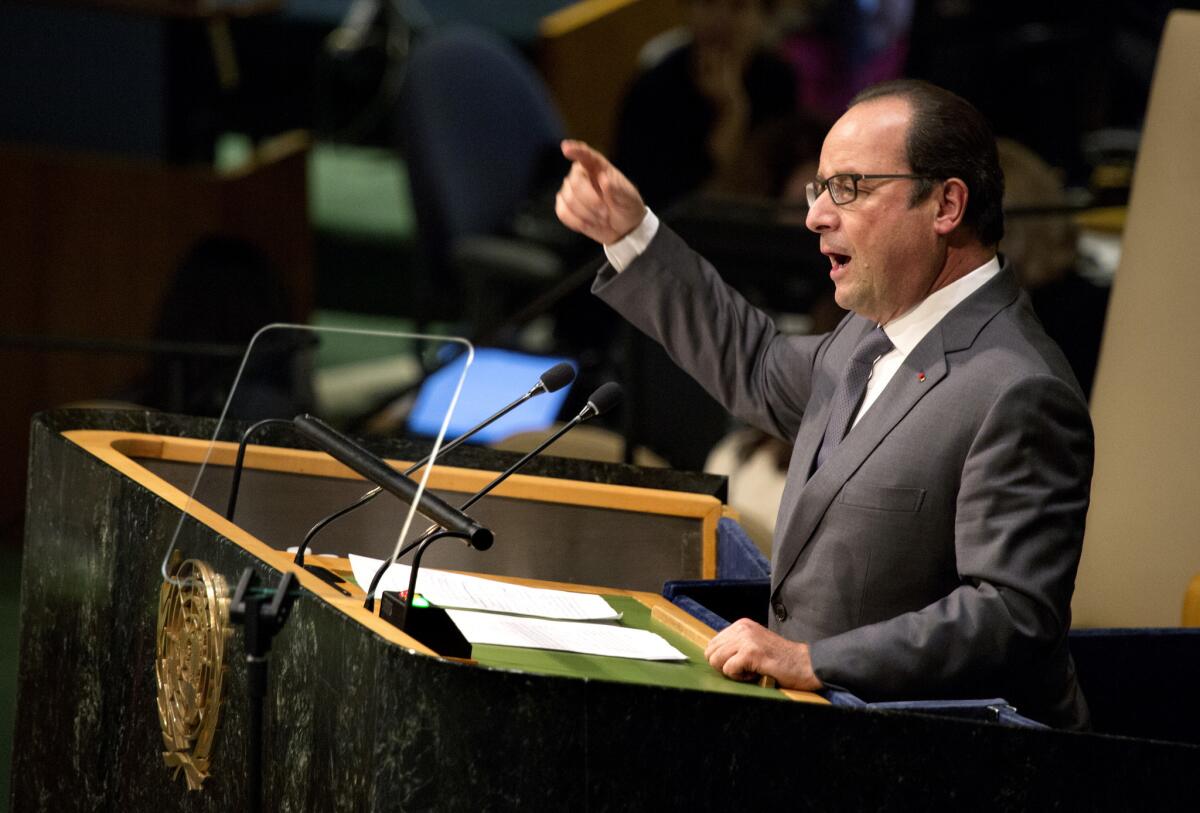
French President Francois Hollande at the 70th session of the United Nations General Assembly on Sept. 28, 2015.
French President Francois Hollande rejected a call by Russia's leader to include the government of Syrian President Bashar Assad in any solution to the country's deadly civil war.
"Assad is the origin of this problem," Hollande said through an interpreter at the 70th session of the United Nations General Assembly. ¿He cannot be part of the solution.¿
Whether Assad remains in power has become a major sticking point between Russia and the West as world leaders try to find solutions to the four-year conflict that has generated a massive refugee crisis in the Middle East and Europe.
Russian President Vladimir Putin earlier called for the formation of a broad coalition, including Assad, to fight the extremist group Islamic State.
The U.S. and its allies are open to cooperating with Russia against the militants. But President Obama reiterated Monday that Assad must go.
Obama, Putin share a table at lunch
President Obama and his Russian counterpart, Vladimir Putin, shared a table during a leaders lunch hosted by U.N. Secretary-General Ban Ki-moon.
The two clinked glasses, but judging by the look on Obama's face, it was a strained encounter.
Putin and Obama will have a chance to discuss their differences over Syria and Ukraine at a bilateral meeting later Monday.
Obama, Modi discuss 'critical issue' of climate change
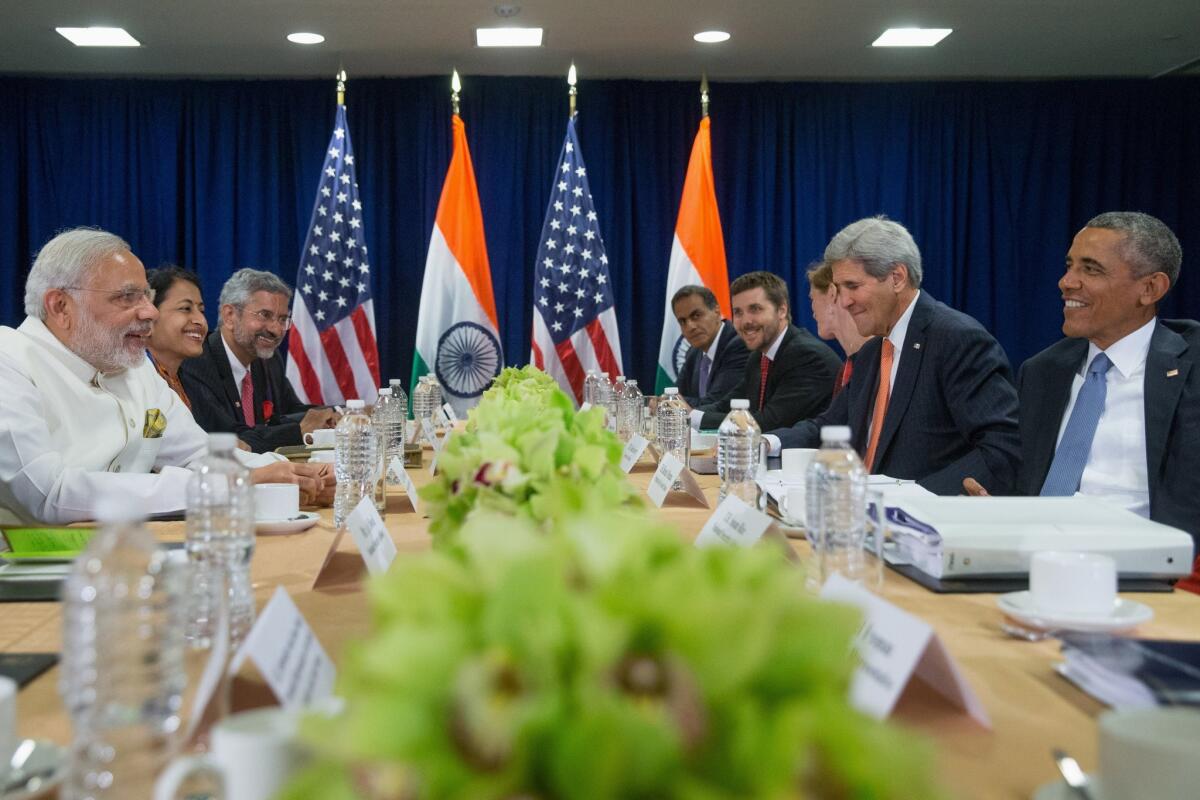
President Obama holds a bilateral meeting with Indian Prime Minister Narendra Modi, front left, at the United Nations headquarters in New York on Sept. 28, 2015.
President Obama thanked Indian Prime Minister Narendra Modi for his "aggressive" commitment to clean energy after they met on the sidelines of the U.N. General Assembly.
"Much of our discussion today focused on the upcoming climate conference in Paris," Obama told reporters. "We agree that this is a critical issue for the world, and all of us have responsibilities."
India is one of the last major polluters yet to submit its plan to the United Nations for combating climate change before world leaders try to finalize a global pact at the conference in Paris in December.
"What I said is that I really believe that India's leadership at this conference will set the tone not just for today but for decades to come," Obama said.
Modi said the two leaders "share an uncompromising commitment on climate change without affecting our ability to meet the development aspirations of humanity."
The pair also discussed trade and investment, Obama said, adding that Modi is hoping Indian Americans can contribute to his country's growth.
That's a lot of hand-shaking
U.N. Secretary-General Ban Ki-moon has more than 100 one-on-one meetings scheduled during this year's gathering of world leaders at the General Assembly.
Iran's president blames Saudi Arabia for death of 'thousands' of pilgrims
Iran's President Hassan Rouhani on Monday lauded the recently negotiated agreement on his country's nuclear program as a "brilliant" example of making peace rather than war.
"The deal can and should herald a new era of sustainable peace in the region," Rouhani said.
The agreement, which was opposed by many Republicans and some congressional Democrats, promises Iran sanctions relief in exchange for accepting stringent curbs intended to prevent Tehran from developing an atomic weapon for at least a decade.
Rouhani called the sanctions "difficult," but said they were not the reason Iran signed the deal.
He repeated his call for a nuclear-free Middle East, a reference to Israel, which has not publicly acknowledged that it has such weapons.
Rouhani also criticized Iran's longtime rival, Saudi Arabia, for the deaths of "thousands of Muslim pilgrims and hundreds of our own citizens" during this year's hajj.
Those are higher figures than acknowledged by the Saudi Health Ministry, which has put the toll at 769 people killed and 934 injured. But foreign diplomats say they have been told the numbers are significantly higher.
They "unfortunately fell victim to the incompetence and mismanagement of those in charge," said Rouhani, who plans to cut short his visit to New York and return to Iran for the arrival of the bodies.
He called for an "independent and precise investigation" of the disaster.
The meaning in a meeting
When President Obama meets his Russian counterpart, Vladimir Putin, on Monday, he'll do so in a setting where the U.S. flag stands next to that of Russia -- a small but significant feature of protocol that signals the importance of the conversation.
It's a stark contrast from the fleeting exchanges the two leaders have had on the sidelines of other world summits in recent months, when they have mused coldly about the scenery and exchanged not-so-pleasant pleasantries.
It's all part of the delicate dance of diplomacy, an especially difficult choreography at this annual gathering of world leaders during which the demand for face time with the U.S. president far outstrips what's available.
The United Nations General Assembly meeting is "always a time for us to get a lot of business done," said one senior advisor involved in planning Obama's schedule, "and this year we have a lot of business to tend to."
As a result, there will be several "bilateral engagements" as well as lots of contact on the sidelines, the advisor said. Obama's staff has been working out every detail, including who will go up the escalator or down the elevator with the president.
"We have to seize every moment," said the advisor, who was not authorized to speak publicly about the arrangements.
Leaders of favorable standing and high currency get the most time. On Monday, for example, Obama sat down with Indian Prime Minister Narendra Modi, who could provide a huge assist to the president as he attempts to pump up the global alliance against climate change.
Also on that list was U.N. Secretary-General Ban Ki-Moon, who embodies the principle of international engagement that Obama wants to highlight this week.
(Of course, Pope Francis and Chinese President Xi Jinping will have spent even more time with Obama as they were invited to the White House in the run-up to the U.N. gathering.)
Cuban President Raul Castro's meeting with the president on Tuesday -- which will also involve the posting of national flags -- speaks to Obama's desire to underscore the progress made in diplomatic relations over the last year, especially the fruits of engagement.
A meeting gives Obama the chance to laud the warming of relations between the two countries, while emphasizing that if Cuba's human rights record doesn't improve, the U.S. won't lift its trade embargo on the island nation.
The meeting with Putin, however, serves as a reminder that the U.S. president isn't calling all the shots.
Obama has been keeping Putin at arm's length because of their differences over the conflict in eastern Ukraine and Russia's military buildup in Syria. But the Russian delegation requested the meeting and, given all that's at stake, Obama's advisors thought it best to hear him out.
It won't take place during a "family photo" or in a hallway either. This encounter will have all the trappings and status of a full bilateral meeting.
A diplomatic coup for Putin
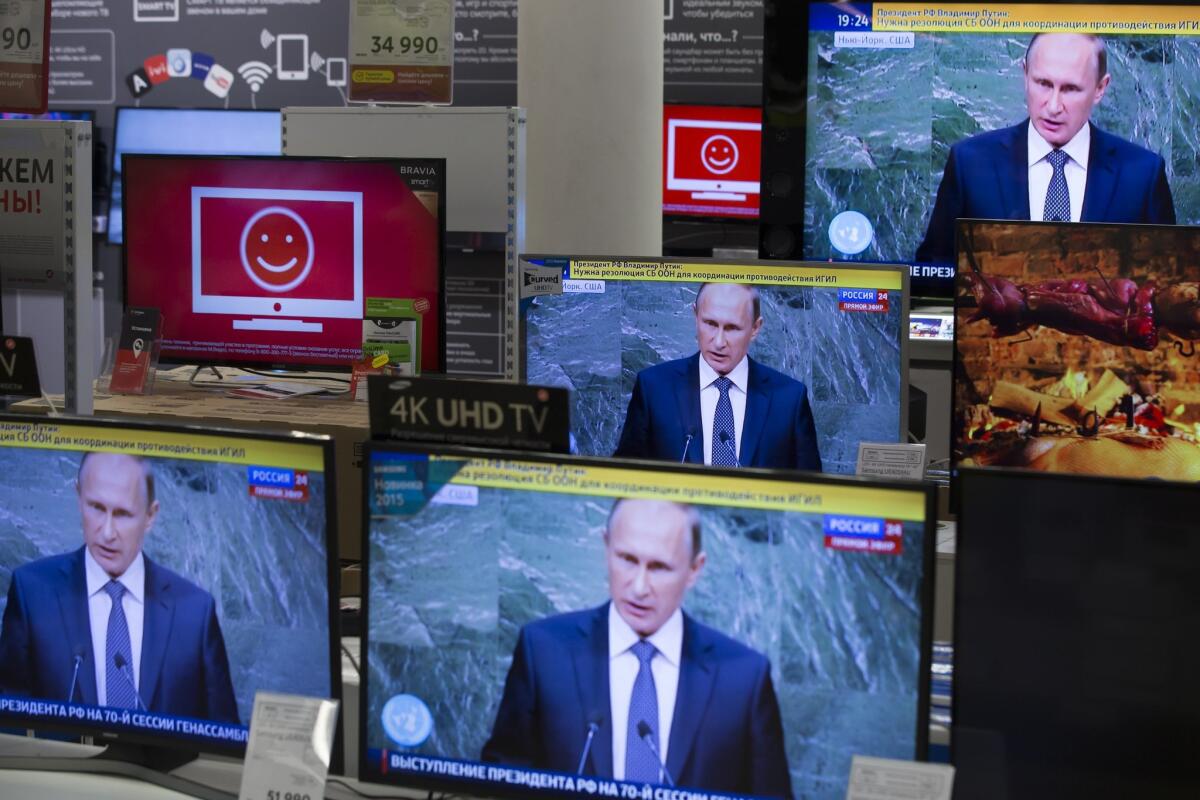
Television screens at an electronics shop in Moscow show Russian President Vladimir Putin at the United Nations General Assembly Sept. 28, 2015.
Kremlin critics and supporters agreed on one thing ahead of President Vladimir Putin's speech before the U.N. General Assembly on Monday: The Russian leader scored a resounding success in reclaiming the world stage after more than a year of being shunned over his Ukraine fiasco.
"He reached his goal before he spoke a word by rapidly deploying Russian forces in Syria and getting Obama to meet with him," said Alexander Goltz, defense analyst for the independent Yezhednevny Journal. "That was his real goal -- Putin wants to reverse the international isolation that has resulted over Ukraine."
Goltz disputed U.S. intelligence forecasts of massive Russian airstrikes in Syria to prop up the embattled regime of President Bashar Assad, the Kremlin's closest ally in the Middle East.
Nor will Moscow's warplanes engage in significant aerial bombardment of Islamic State positions in Syria, he said, claiming the call for a coordinated fight against the Islamist militants has been a pretext to force Washington to comply with the Kremlin's aim of keeping Assad in power.
Putin genuinely believes the Arab Spring conflicts in the Middle East and the so-called color revolutions in former Soviet states are the result of an American-led Western conspiracy to denigrate Russia and sever it from traditional allies, Goltz said. "This has been a long stare-down, and Obama blinked first."
Kremlin political consultant Alexei Mukhin credits Obama with inadvertently fanning Russian national pride with his references to a new Cold War developing in the wake of Putin's annexation of Ukraine's Crimea region.
"Barack Obama made a strategic mistake when he said we were in Cold War 2.0," said the advisor who heads the Center for Political Information, whicht counts the Kremlin as its most important client.
The post-Soviet refrain that Russia lost the Cold War demoralized Russians, who took great pride in the communist-era country's military accomplishments around the world, Mukhin said.
"A lot has been said about the Soviet past and how everything that was good has been taken from us since its demise," Mukhin said. "Now Barack Obama, like a magician, has brought back the spirit of the Cold War and given Russians a new chance to win it."
Putin makes his pitch on Syria
The world should join Russia in cooperating with the Syrian government against Islamist extremists, the country's President Vladimir Putin said at the U.N. General Assembly.
Putin, who is sharply at odds with the West over Russia's policies in the Middle East and Ukraine, defended his actions in both arenas.
Russia is one of the most important allies of Syrian President Bashar Assad, who President Obama reiterated Thursday should be replaced as part of a political settlement to end the civil war that has driven millions of people from their homes.
Putin called on the West to drop its demand and focus instead on fighting Islamic State, the militant group that has made major gains in Syria and Iraq.
"We think it is an enormous mistake to not cooperate with the Syrian government," Putin said.
"We should finally acknowledge that no one but President Assad's armed forces and Kurdish militias are truly fighting the Islamic State and other terrorist organizations in Syria."
Putin acknowledged criticism of Russia's military buildup in Syria, which has included warplanes, helicopter gunships and armored vehicles, along with troops.
But he said accusations that Russia is attempting to build status and power in the region are nothing but a "pretext."
King Abdullah II of Jordan used an address at the U.N. General Assembly to defend what he called the kinder face of Islam and to call for action against Islamic State and other extremist groups.
Abdullah said the rise of fundamentalism in the Middle East has caused "a third world war, and I believe we must respond with equal intensity."
"All moderates of all faiths," should unite "against all extremists of all religions," the king said.
Jordan, which shares a border with Syria, has taken in more than 600,000 refugees from the conflict there.
Diplomats say the darndest things
Similar words can sometimes come from the most different sources.
On Monday, President Obama and China's President Xi Jinping made almost the same argument in urging world leaders to increase diplomacy as an alternative to war.
In his speech to the U.N. General Assembly, Obama urged diplomats to reject what he called old ideas that "power is a zero sum game" and "might makes right."
Xi, who has just completed a state visit to Washington, said: "The law of the jungle leaves the weak at the mercy of the strong.
"It should not be that way," he said.
Xi to world leaders: Help smaller countries deal with climate change
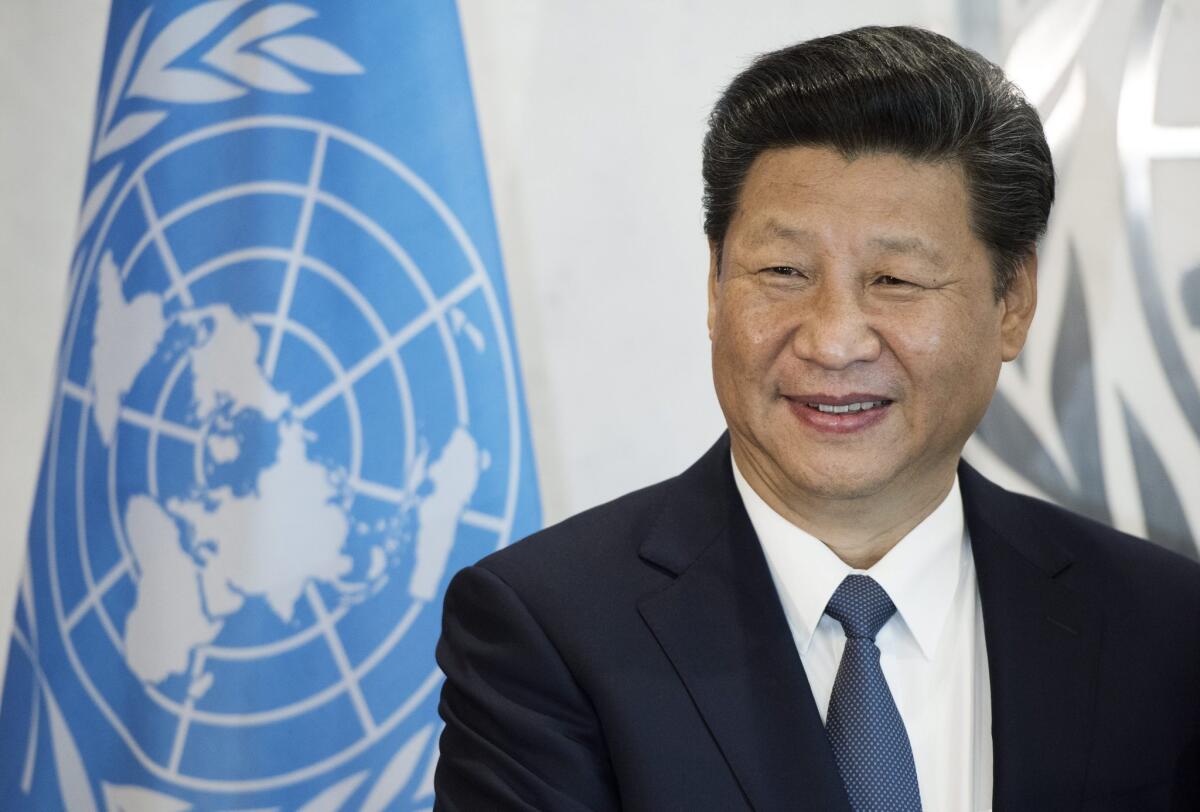
Chinese President Xi Jinping at the United Nations on Sept. 26, 2015.
In an address to the U.N. General Assembly, Chinese President Xi Jinping called on large, developed countries to be more respectful toward smaller ones, especially on environmental issues.
Despite its size and economic power, China has long sought to lead a bloc of less developed nations, a political offset to the power of the more developed world.
"The movement toward a multi-polar world has become an irresistible trend," Xi said. "We should build partnerships among countries that treat each other as equals. The big should not bully the small."
Less developed countries complain that they are being forced to take on a greater proportional cost of cleaning up the environment than wealthier nations and find that their economic development is hindered.
China stands ready to meet environmental goals, Xi said, but he urged more developed countries "to fulfill their historic role in helping developing countries to mitigate and adapt" to climate change.
The "growing gap between rich and poor is unsustainable and unfair," Xi said.
Obama: Assad leaving power must be part of solution in Syria
President Obama called for the end of the regime of Syrian President Bashar Assad on Monday morning, signaling to the world, particularly Russian President Vladimir Putin, that the U.S. will oppose Moscow's efforts to back Assad in the civil war that has torn apart his country.
Speaking to world leaders gathered for the United Nations General Assembly, Obama rejected the assertion that Assad is the better alternative to the Islamic State and other extremist groups terrorizing Iraq and Syria.
Some suggest that "we should support tyrants like Bashar al-Assad, who drops barrel bombs on innocent children, because the alternative is surely worse," Obama told the assembly.
Yes, he said, a realistic worldview suggests that compromise is necessary to end the violence. He noted that the U.S. and Assad are battling a common enemy in the Islamic State terrorist group.
A solution also requires a "managed transition away from Assad and toward a new leader," Obama cautioned.
"When a dictator slaughters tens of thousands of his own people, that is not just a matter of one nation's internal affairs," he said. "It breeds human suffering on an order of magnitude that affects us all."
But Obama did not pinpoint exactly when he thinks Assad must go, a nod to the widespread concern among world leads that the Syrian leader’s immediate departure might result in the fall of government instititutions. In the chaos, they fear, the Islamic State would move in to fill the vacuum.
With a tide of Syrian refugees flooding into Europe and its Syria policy faltering, the Obama administration and its allies are considering a peace formula that would allow Assad to remain in office, at least on an interim basis.
His remarks came as Obama prepares to meet later this afternoon with Putin largely to talk about the conflict in Syria. Russia has built up its military presence in Syria in recent weeks in a bid by Putin both to make himself and his nation central to the international efforts to end the war there and to escape the isolation that the U.S. and its allies have left Russia in over its support for separatists in Ukraine.
Putin's Syria gambit
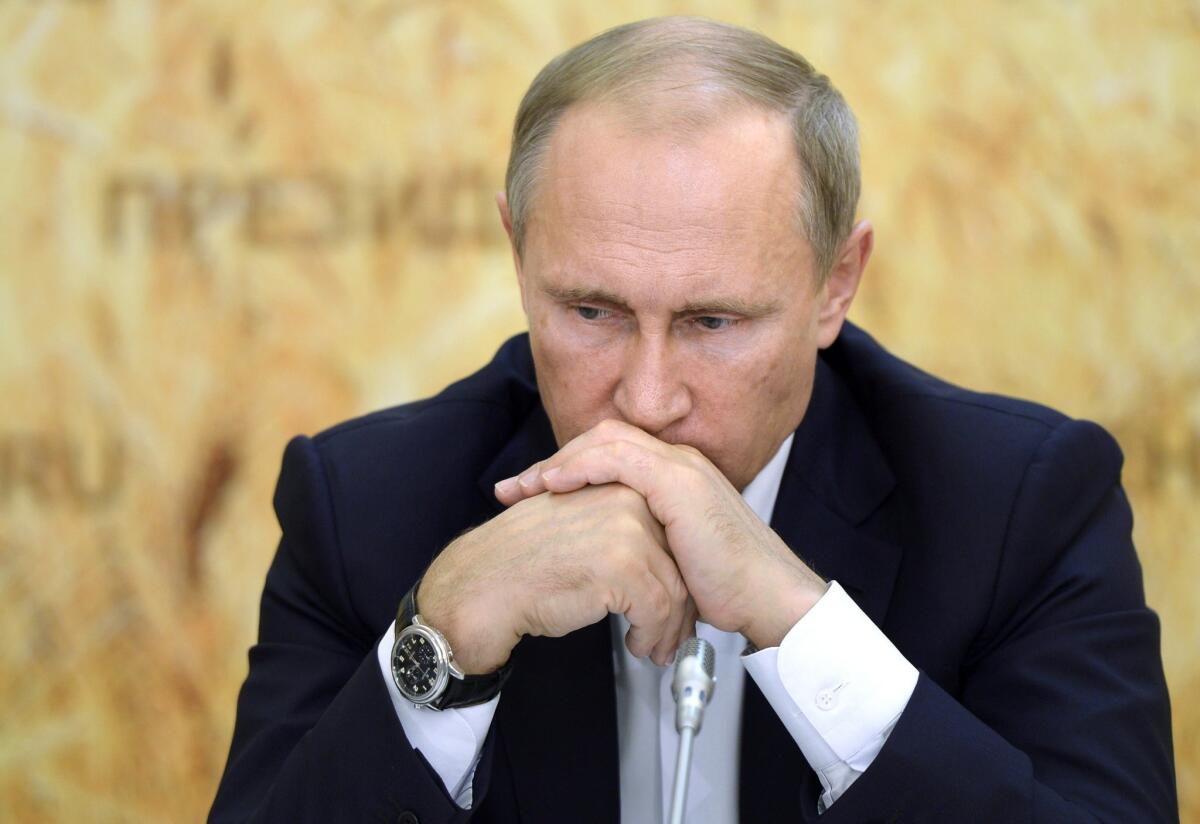
Russian President Vladimir Putin in the Rostov region on Sept. 24, 2015.
Kremlin officials have been on a diplomatic blitz for months that analysts see as having the twin objectives of diverting attention from Russia's disastrous interference in Ukraine and of spotlighting the more ominous threat to global security posed by extremist militias such as Islamic State.
Diplomatically ostracized for annexing the Crimea region from Ukraine and backing pro-Russia separatists near the eastern border, Russian President Putin has succeeded in changing the global security conversation from the East-West tensions provoked by his Ukrainian gambit to one of opportunity in Syria for the former Cold War adversaries to collaborate on a more existential threat.
Much will depend on how Putin's overture Monday at the General Assembly is received by Obama administration officials. Secretary of State John F. Kerry has been pushing behind the scenes for talks with Russia on Syria, and he and other officials are open to some sort of military cooperation aimed at "deconfliction" of Syrian skies potentially crowded with rival aircraft.
Kerry has also suggested that the Obama administration is willing to leave Syrian President Bashar Assad, a longtime Russian ally, in power for some time, though not indefinitely.
But U.S. officials remain uncertain of Putin's motives, have little trust in him, and fear that the Syria buildup is more about protecting Assad than trying to broker a solution to the war.
Western leaders have mostly shunned Putin for aggression against Ukraine, which they consider a violation of international law. But a break in that posture is expected after Putin's speech, including a face-to-face meeting with Obama.
Brazil is open to refugees, president says
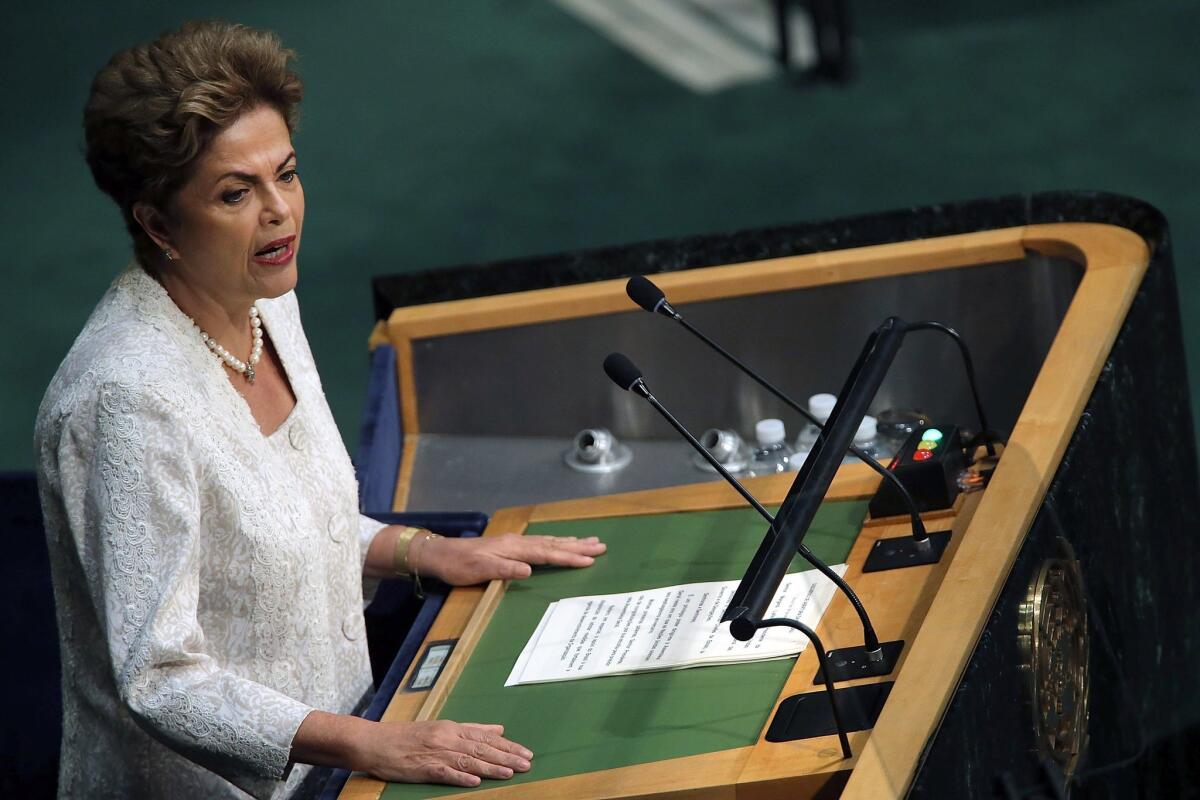
Brazilian President Dilma Rousseff at the United Nations General Assembly on Sept. 28, 2015.
The president of Brazil on Monday condemned "barbaric acts" of terrorism in the Middle East and called on world leaders to do more to deal with the refugee crisis that has roiled Europe.
"It is absurd to prevent the free movement of people," President Dilma Rousseff told diplomats at the opening of the 70th session of the U.N. General Assembly.
"We remain open," Rousseff said. "We have our arms open to welcome refugees. We are a multi-ethnic nation."
Nearly 500,000 refugees and migrants have poured into Europe this year from the Middle East, Africa and Asia. About half of them are Syrians fleeing a calamitous civil war.
U.N. General Assembly president urges 'unifed action'
The world must put aside its differences and work together to conquer poverty, Mogens Lykketoft, president of the U.N. General Assembly, told fellow diplomats Monday.
"Global interdependency is more pronounced than ever before," Lykketoft said. "So too is the urgency for unified action."
Lykketoft sounded what will be the major themes of the session: Ending wars and conflicts, dealing with climate change, eradicating poverty and expanding human rights, particularly for women and children.
Ban urges referral of Syria war to International Criminal Court
The civil war in Syria has been so brutal that it should be referred to the International Criminal Court, U.N. Secretary-General Ban Ki-moon told world leaders Monday.
¿Innocent Syrians pay the price of more barrel bombs and terrorism¿ and other "atrocious" crimes, Ban said, as he delivered the equivalent of a State of the World speech at the U.N. General Assembly in New York.
He said the conflict is "driven by regional powers and rivalries." The key to peace lies with Russia, the United States, Saudi Arabia, Turkey and Iran, he said.
What to look for in Iran leader's speech
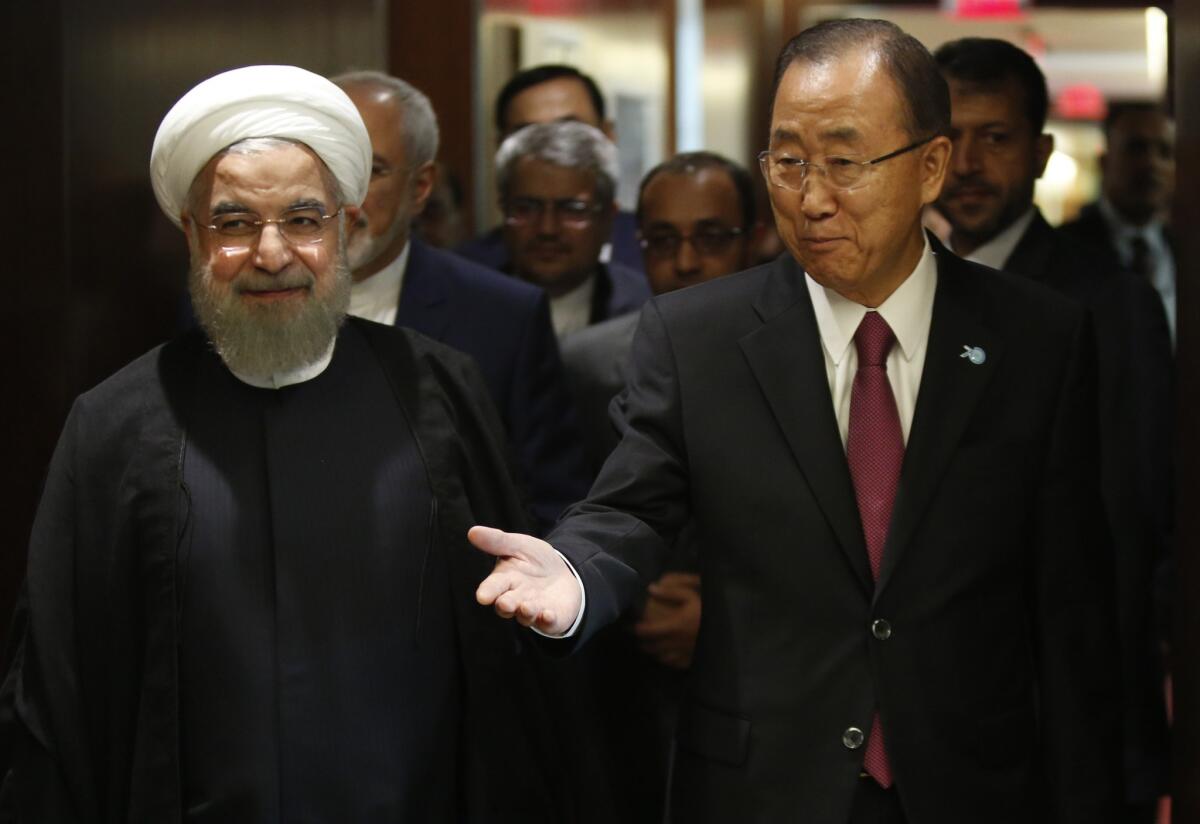
Iranian President Hassan Rouhani, left, with United Nations Secretary-General Ban Ki-moon in New York on Sept. 26, 2015.
Iranian President Hassan Rouhani's speech at the United Nations will be among the most closely examined, for what he says about implementation of this year's landmark nuclear deal, the Syrian civil war and Tehran's openness to improving relations with the West.
Hints that Iran may be prepared to free Americans detained in the country in exchange for the release of several Iranians held in the United States have also raised interest in the address.
Iran isn't as central to world leaders' concerns as it was last year, when the U.N. Security Council's five permanent members and Germany were in the middle of arduous negotiations over the nuclear deal. But implementation of the accord, which is expected to begin in October, will be a major challenge.
World leaders will be watching to see if Rouhani signals that Iran is fully committed to carrying out its side of the bargain.
Rouhani met Friday with senior officials from several U.S. news organizations in New York and expressed hope for "quicker" movement in both countries on the prisoner issue, the Washington Post reported. A Post reporter, Jason Rezaian, has been held in Tehran for more than a year on charges that include espionage and is awaiting a verdict from Iran's Revolutionary Court.
The U.S. and Russia have recently begun talks about the war in Syria and efforts to combat the Islamic State militant group. That has raised questions about whether Iran, one of the Syrian government's most important backers, would also be willing to expand discussions with the United States on regional topics.
Rouhani has intermittently signaled that his country might be interested in exploring ties with the U.S. that go beyond the nuclear deal. But the country's top official, supreme leader Ayatollah Ali Khamenei, has continued to harshly denounce the U.S. since the accord was announced July 14.
Obama's agenda at the U.N.
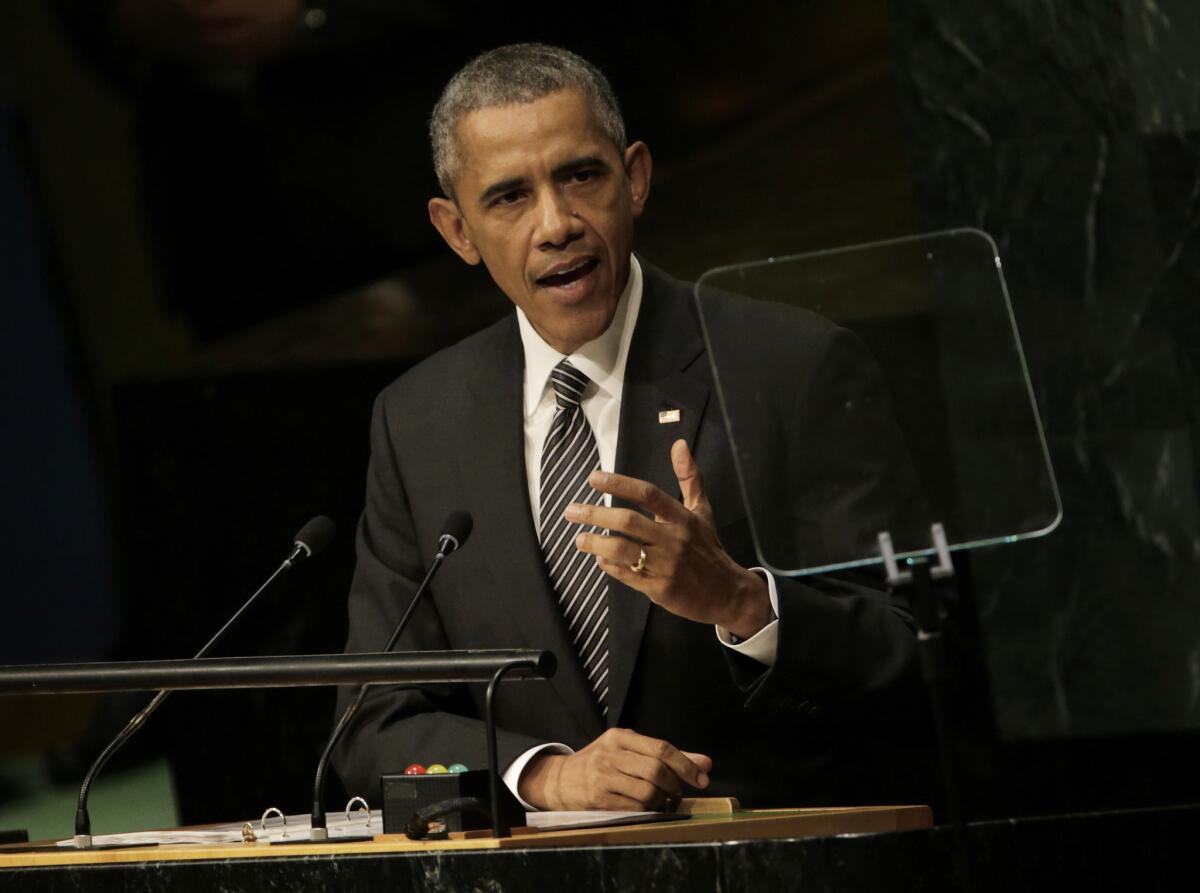
President Obama delivers remarks at a United Nations sustainable development summit in New York on Sept. 27, 2015.
President Obama plans to sit down with the leaders of Russia and Cuba over the next two days as he responds to crises and tries to advance his agenda during the annual meeting of world leaders at the United Nations General Assembly.
On Monday, Obama will meet will Vladimir Putin for a session that American diplomats hope will clarify the Russian president's intent in Syria, if not persuade him to roll back support for the country's embattled leader, Bashar Assad, as well as for separatist fighters in eastern Ukraine.
On Tuesday, Obama sits down with Cuban President Raul Castro, a meeting that comes amid a warming of relations between the U.S. and the island nation.
In both cases, the American flag will be planted next to that of the foreign leader's country in a specially designating meeting room, a sign that Obama is not merely shaking hands with his counterparts on the sidelines of other events, but rather making the conversations a focus of his visit.
But the broader message of the American president on this, his seventh annual pilgrimage to the international assembly, will be conveyed during his speech on Monday morning, when he plans to address issues that are high on his to-do list, as well as crises that keep forcing their way onto it.
Obama wants world leaders to focus on the fight against poverty and climate change, two priority items for the president, along with pursuing a policy of U.S. engagement that has yielded a thaw in relations with Cuba and an international deal on Iran's nuclear program.
"Of course, we will have to be addressing some very significant global challenges," said Ben Rhodes, Obama's deputy national security advisor, citing the Islamic State extremist group, the humanitarian crisis in Syria and the conflict in eastern Ukraine.
After addressing the General Assembly, Obama has a one-on-one meeting scheduled with Indian Prime Minister Narendra Modi, whom the president considers a key player in forging a meaningful agreement on climate change by the end of the year.
Obama will also be convening a summit on peacekeeping, where world leaders plan to commit troops and other resources to U.N. operations around the globe.
At the end of the day, Obama plans to sit down with Putin, a meeting that U.S. officials say was requested by the Russian delegation.
On Tuesday, Obama is convening a summit to discuss the fight against Islamic State and other extremist groups -- a vexing problem for the president, who was elected on promises to end the war in Iraq but now can't seem to extricate U.S. forces from the violence there.
The meeting with Castro will provide Obama an opportunity to review progress on the normalization of relations with Cuba in a year that saw the reopening of the U.S. Embassy in Havana.
"Now, we'll have differences, and particularly with respect to human rights, we have been very clear with Cuba that we'll continue to raise those differences," said Rhodes. "But we also believe that the best way to advance our interests and our values in Cuba is to open it [to the world]."
Ban: 'We are not receiving enough money to save enough lives'
U.N. Secretary-General Ban Ki-moon told diplomats gathered for the 70th session of the General Assembly on Monday that the international community must work to end poverty, aid refugees and confront the need to deal with the problems of climate change.
"You world leaders are committed to leave no one behind and reach those furthest behind first," Ban said.
He said the U.N. must weave together its good works with political goals, including promoting human rights, the rights of women and the rule of law.
On the issue of refugees, one of the key questions facing the United Nations this year, Ban was blunt: "We are not receiving enough money to save enough lives."
"People are on the move as never before," the secretary-general said, urging Europe to do more to aid refugees from Syria and beyond.
"These are complex issues," Ban said of the movements of people across the world, including from Latin America to the United States, adding that they also spark "strong passions."
The Syria quandary
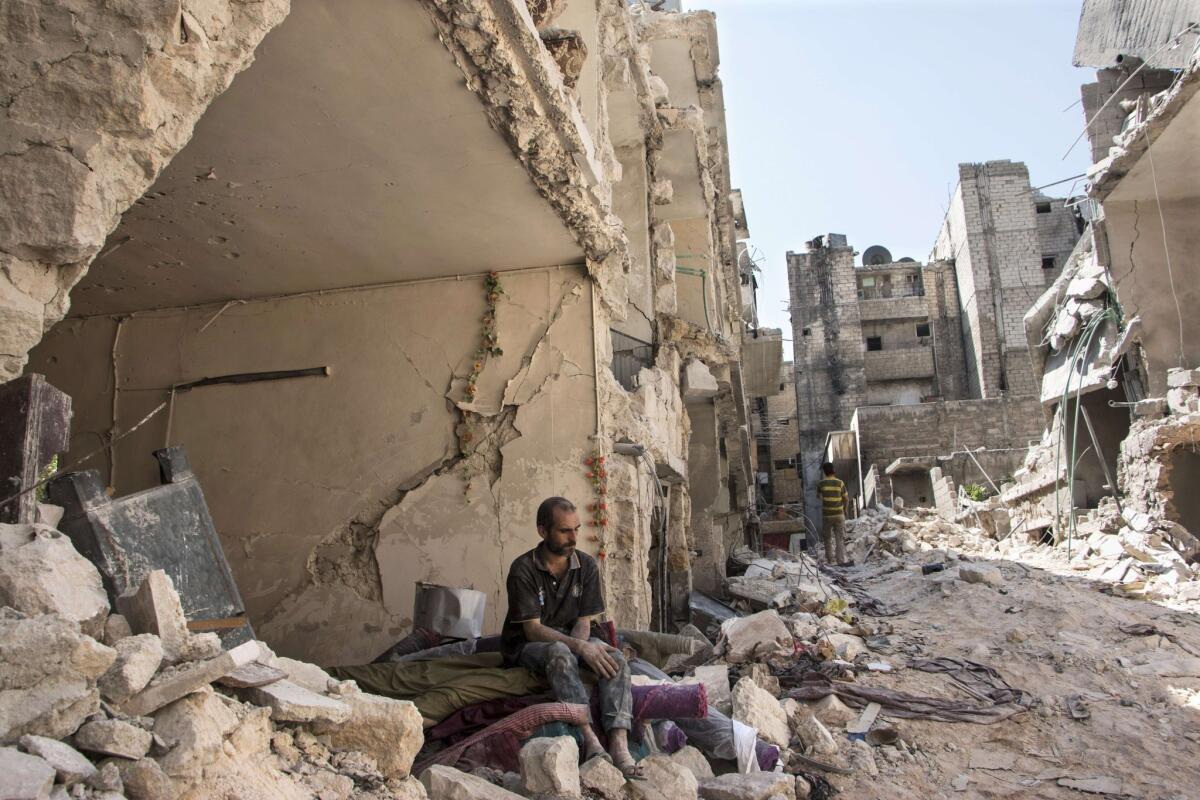
A Syrian man sits amid the rubble in the northern Syrian city of Aleppo on Sept. 17, 2015.
Looming large over this year's U.N. General Assembly gathering is the Syrian civil war: how to end the bloodletting, battle the violent extremist groups emerging from it and stem the flood of refugees flowing from it.
At the center of the debate will be Russian President Vladimir Putin, whom the West has tried to isolate for the last year for his aggressive support of armed separatists in eastern Ukraine.
Putin is expected to bash the West for failing to roll back Islamic State fighters from Syria and Iraq, and to argue that Washington and its allies need to stop trying to oust his ally, Syrian President Bashar Assad, and focus instead on battling extremists.
Russian diplomats have tried to line up support for a U.N. Security Council statement to endorse Putin's view of the fight, and give an international blessing to the Kremlin's military buildup in Syria.
U.S. officials have refused to negotiate with Russia over the proposed statement because they say it would entrench Assad without leading to a peace deal. Diplomats from several countries predicted that Moscow's proposal would fail.
The White House is prepared to cooperate with Russia against Islamic State. But U.S. officials say Putin's military goals and other objectives remain unclear, and they worry that Russian attacks in Syria could worsen the war, not resolve it.
A time of 'turmoil and hope'
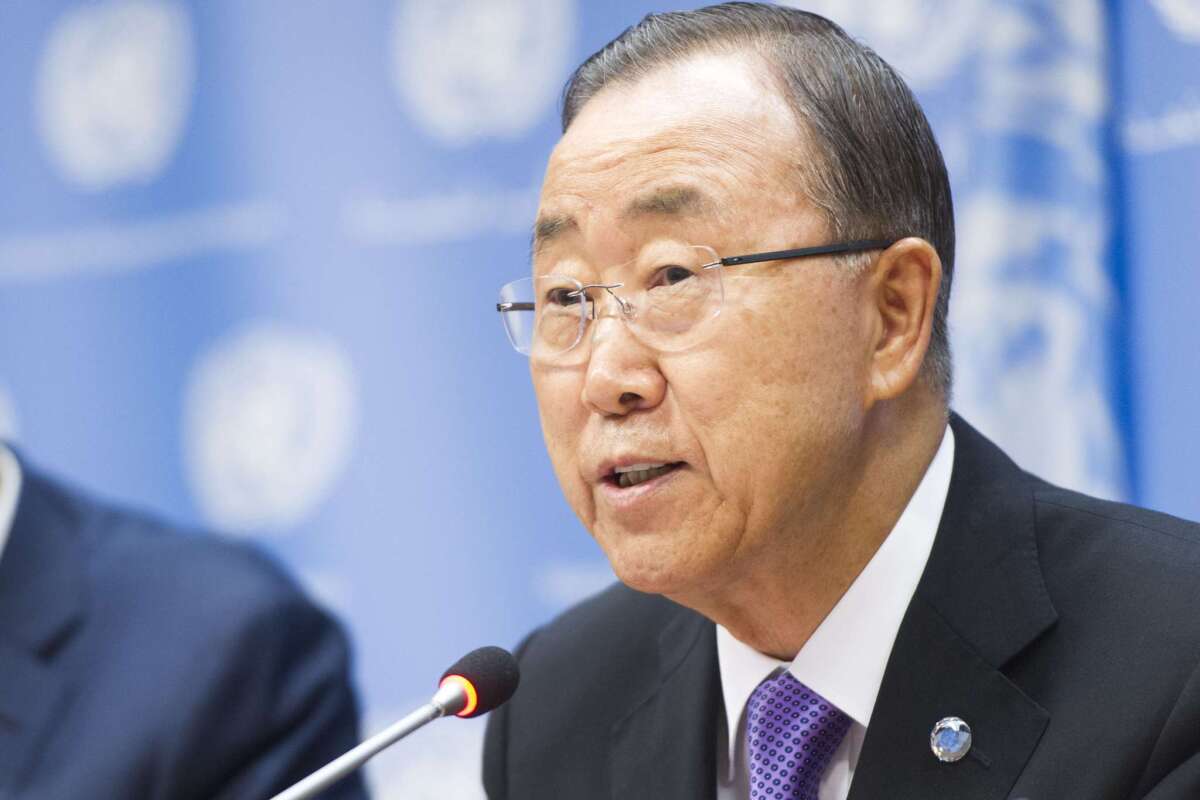
U.N. Secretary-General Ban Ki-moon addresses a news conference at the United Nations headquarters in New York on Sept. 16, 2015.
World leaders are gathering at a time of "turmoil and hope," United Nations Secretary-General Ban Ki-moon told reporters as the 70th U.N. General Assembly gathering got underway this month.
"Turmoil because conflicts have deepened in so many places, and civilians are paying the price," he said.
"Hope because a historic number of world leaders will gather here to forge solutions and adopt an inspiring new development agenda."
More than 150 heads of state and government took part in a weekend summit to formally adopt a sweeping agenda to eradicate extreme poverty, improve health and encourage efforts to combat climate change.
On Wednesday, Ban is convening a high-level meeting to mobilize a "humane, effective and rights-based response" to a refugee crisis that has seen about 60 million people driven from their homes by brutal conflicts, breakdowns in basic governance and economic despair.
There will also be meetings during the week about U.N. peace operations around the world.
Ban said he is calling for three key changes: "One, an urgent emphasis on conflict prevention and mediation; two, steps to improve the speed and agility of United Nations peacekeeping and political missions; and three, deeper partnerships with regional organizations, in particular the African Union."
Watch world leaders live at the U.N.
President Obama and the leaders of Russia, China, Iran and Cuba are among more than 35 heads of state and government scheduled to deliver speeches at the United Nations on Monday.
Start your day right
Sign up for Essential California for news, features and recommendations from the L.A. Times and beyond in your inbox six days a week.
You may occasionally receive promotional content from the Los Angeles Times.



